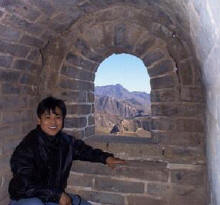Leo’s Story
Beijing, China


Leo on the Great Wall
![]()
![]()
Liu Yue Lai (aka “Leo”) manages the backpacker portion of the Sea Star Hotel in decrepit south Beijing. I estimate he has a 10th grade education although he has taught himself English and speaks rather well. A personable young 24-year old, he stands 5′ 5″ tall and dresses sharply in the same black sport coat and pants every day. The most noticeable quality about Leo, however, is that he positively radiates ENERGY! His vigor, coupled with the burning desire to own his own business and grasp of capitalistic principles, makes him case study for the changes taking place in China.
I met Leo within three hours of arriving in China. He bounded into the hotel office carrying his lunch after a quick lunch trip to the local street vendors.
Leo: (with food in hand) “Welcome to Beijing! I hope you enjoy my country.”
Me: “Thanks. By the way, do you know a good place to eat nearby?”
Leo: “You want to eat? Now?”
Me: “Uh . . . sure.”
Leo: “I take you to good restaurant. We go now?”
Me: “Whatever you say.”
Leo: “Here, try my food. It’s good. Traditional Chinese street food.”
I couldn’t believe how friendly and energetic this guy was. “Where’s the catch?” I thought. “When is this guy going to rip me off?”
But the rip-off never came. Leo was an honest and genuine soul. Although reluctant to trust a stranger, I couldn’t help but be drawn to Leo’s love for life and garrulous nature.
In retrospect, I realize that his energy and business sense were truly remarkable given his lack of education and profession. As I traveled through China and frequented other bargain-basement backpacker hotels, I found only sour-faced staff. Not even a healthy dose of southern charm could sweeten those frowns.
After dinner, Leo decided we should view the sites of Tiananmen Square at night. As we toured, Leo taught me a few Chinese words. He must’ve been enjoying himself because he invited me to the Great Wall the following day.
Leo (energetically): “Jason, I take to you REAL Great Wall tomorrow. No tourists! I have friend with car who lives there. Don’t worry, he is very good friend. I call him and say, “John, I want to visit Great Wall with my American friend tomorrow. Can you go and drive car?” He will say, “Of course, Leo – you my very good friend!” Is OK. No problem! I introduce you to my girlfriend too. She not very beautiful, but is OK for me. I love her. Tomorrow will be GOOD day!” That’s how Leo talked – bursts of spontaneous and contagious enthusiasm.
So the following day I headed out early with my new friend to see the fabled Great Wall of China. Three bus changes later I found myself in Yanqing (Yahn – ching), which is a small town about 20 miles Northwest of Beijing. We met Leo’s girlfriend and his friend, had a delicious breakfast of rice soup and fried dumplings and then departed for the countryside.


Leo in a Great Wall lookout tower
![]()
![]()
I soon learned of Leo’s ulterior motive for going to the Great Wall – he dreams of owning a hostel there. He wants John, a cab driver in Yanqing, to purchase a small plot of land where they will establish an inexpensive Bed and Breakfast. Leo will provide the hotelier know-how and send clients from the Sea Star while John and his wife manage the daily operations.
A typical outburst from Leo (LOUDLY):
“JASON! What do you think?!? Is this good spot? Do you like it? Will this be good? I think it’s good. REAL Great Wall. Not repaired like Badaling (heavily touristed portion).”
“I say to customer, ‘Come to John and Leo’s. You have problem with hotel, you call me 24 hours a day at 555-7383. I help you. 24-hour hot water. GOOD food. Visit WILD Wall! See how Chinese peasant lives. Traditional Chinese living. Breath FRESH air! ONLY 25 YUAN!! (~ $3.00).'”
“What do you think, Jason?!? Is good? I think so.”
I’m tellin’ ya, the guy was a great salesman. I got excited for him as he touted the virtues of the location and his wonderful ideas. It was a beautiful day and I’m sure Leo felt anything was possible.
As we hiked the Wall, Leo noted where “Danger” signs would be placed. He also timed how long the hike would be from his hostel to the closest portion of the Great Wall (about 10 minutes). I asked him if the government would approve his ideas about signs on this portion of the Great Wall.
Leo: “Why not? My business will be good for the villagers. Improve their life! Signs will keep the trail safe.”
I also asked about purchase of the land. He said one of the villagers would sell a plot for 10,000 yuan ($1,250). (For reference sake, a peasant makes about $375 a year.) Two days later he said the local government official would need a bribe of several thousand yuan to approve the purchase. I got a sense that this type of corruption is common.
Back in Beijing, I became an unwitting participant in another variety of Chinese corruption. I had asked Leo to make a reservation for me to attend a performance of Chinese acrobatics and invited him along.
Upon arriving at the theater, Leo began to act peculiar. First, he wanted me to wait out of sight while he purchased my ticket. Then he came back and said he wouldn’t be able to attend because the staff would not let him in. Instead, we would meet after the show.
Me: “Huh? What’s the problem? I’LL pay for your ticket, Leo. It’ll be my treat . . . as a way to thank you for taking me to the ‘Wild Wall'”.
Leo (hurriedly): “OK. Let’s go.”
I handed him $8.00 and off we went. But he didn’t buy a ticket and I didn’t see him hand anything to the attendant as we dashed through the door. It all happened so quickly. Once seated, Leo pointed to the stern female ushers guarding the ‘good seats’ section in front.
Leo: “Jason, they know my face here. See that woman? I hope she doesn’t talk to me. You don’t understand. It’s the Chinese system.”
I decided to press him for more information. Here’s what I could gather:
At state-run theaters, tickets are sold to the public either through a government ticket office or agencies such as hotels. Sometimes theater employees will sell tickets at reduced rates, not tell the government and pocket the cash. People like Leo serve as middlemen. I pay a slightly inflated price over what Leo pays, but still less than if I bought directly from the government ticket office; hence, the creation of a black-market.
Because Leo knows the ticket staff so well, he is sometimes allowed free entry. I imagine he took my $8.00, gave a hefty portion to the attendant and held on to the rest. Interesting, huh?
The point of Leo’s story is this: In the midst of the capital of China, I found a young man with a vision and dreams. Dreams that rang of free enterprise and capitalism. Dreams that seemed very “American” to me.
Leo’s gut sense for business concepts were in line with everything I learned earning an MBA. He talked about pricing, marketing, working with bureaucracy and most surprisingly, he seemed a zealot for customer service. I loved his energy and motivation. If one gathered an army of Leo’s, ANY business could succeed. Heck, any ARMY could succeed.
Yet for all the talk of free enterprise and ownership, I saw that Leo will be forced to overcome strict government controls and corruption. Leo will require a knowledge of and familiarity with what he called “the Chinese system”. Fortunately he seems adept at working within the system and has the energy and attitude to overcome adversity.
Before leaving the Sea Star I wrote an advertisement for “John and Leo’s” guesthouse. He in turn wrote some basic Chinese phrases and purchased a train ticket for me (on the black market, of course). I have since sent him emails but haven’t heard back. He may just be another face in the kaleidoscope of my travels that I’ll never hear from again. But I hope not.